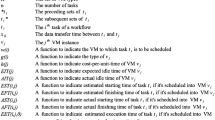Abstract
Temporal violations take place during the batch-mode execution of instance-intensive business workflows running in the cloud environments which may significantly affect the QoS (Quality of Service) of cloud workflow system. However, currently most research in the area of workflow temporal QoS focuses on single scientific workflow rather than business workflow with a batch of parallel workflow instances. Therefore, how to handle temporal violations of instance-intensive cloud business workflows is a new challenge. To address such a problem, in this paper, we propose a novel throughput based temporal violation handling strategy. Specifically, firstly we present a definition of throughput based temporal violation handling point to determine where temporal violation handling should be conducted, and secondly we design a new method for adding necessary cloud computing resources for recovering detected temporal violations. Experimental results show that our temporal violation handling strategy can effectively handle temporal violations in cloud business workflow and thus guarantee satisfactory on-time completion rate.
Access this chapter
Tax calculation will be finalised at checkout
Purchases are for personal use only
Similar content being viewed by others
Notes
- 1.
Hadoop: Open Source Implementation of MapReduce: https://hadoop.apache.org.
- 2.
Amazon Simple Workflow Service: https://aws.amazon.com/swf.
- 3.
References
Liu, X., et al.: The Design of Cloud Workflow Systems. Springer, New York (2012). https://doi.org/10.1007/978-1-4614-1933-4
Liu, X., Yang, Y., Cao, D., Yuan, D., Chen, J.: Managing large numbers of business processes with cloud workflow systems. In: Proceedings of the 10th Australasian Symposium on Parallel and Distributed Computing, pp. 33–42 (2012)
Li, X., Tian, Y., Smarandache, F., et al.: An extension collaborative innovation model in the context of big data. Int. J. Inf. Technol. Decis. Making 14(1), 69–91 (2015)
Liu, X., Yang, Y., Cao, D., Yuan, D.: Selecting checkpoints along the time line: a novel temporal checkpoint selection strategy for monitoring a batch of parallel business processes. In: Proceedings of the 35th International Conference on Software Engineering (ICSE), pp. 1281–1284 (2013)
Wang, S.: An analysis of the optimal customer clusters using dynamic multi-objective decision. Int. J. Inf. Technol. Decis. Making 17(2), 547–582 (2017)
Da Silva, R.F., Filgueira, R., Pietri, I., et al.: A characterization of workflow management systems for extreme-scale applications. Future Gener. Comput. Syst. 75, 228–238 (2017)
Mattmann, C., Medvidovic, N., Mohan, T., O’Malley, O.: Workshop on software engineering for cloud computing. In: Proceedings of 33rd International Conference on Software Engineering, pp. 1196–1197 (2011)
Hwang, K., Donfarra, J., Fox, G.C.: Distributed and Cloud Computing: From Parallel Processing to the Internet of Things. Morgan Kaufmann, Waltham (2013)
Liu, X., Yang, Y., Jiang, Y., Chen, J.: Preventing temporal violations in scientific workflows: where and how. IEEE Trans. Softw. Eng. 37(6), 805–825 (2011)
Liu, X., Yang, Y., Yuan, D., Chen, J.: Do we need to handle every temporal violation in scientific workflow systems? ACM Trans. Softw. Eng. Methodol. (TOSEM) 23(1), 1–34 (2014). Article no. 5
Wang, F., Liu, X., Yang, Y.: Necessary and sufficient checkpoint selection for temporal verification of high-confidence cloud workflow systems. Sci. China Inf. Sci. 58(5), 1–16 (2015)
Vouk, M.A.: Cloud computing–issues, research and implementations. J. Comput. Inf. Technol. (CIT) 16(4), 235–246 (2008)
Liu, X., Yuan, D., Zhang, G., Chen, J., Yang, Y.: SwinDeW-C: a peer-to-peer based cloud workflow system. In: Furht, B., Escalante, A. (eds.) Handbook of Cloud Computing, pp. 309–332. Springer, Boston (2010). https://doi.org/10.1007/978-1-4419-6524-0_13
Yu, J., Buyya, R.: A taxonomy of workflow management systems for grid computing. J. Grid Comput. 3(3–4), 171–200 (2005)
Liu, X., Yang, Y., Yuan, D., Zhang, G., Li, W., Cao, D.: A generic QoS framework for cloud workflow systems. In: Proceedings of the 2011 IEEE 9th International Conference on Dependable, Autonomic and Secure Computing (DASC), pp. 713–720 (2011)
Han, R., Liu, Y., Wen, L., Wang, J.: Dynamically analyzing time constraints in workflow systems with fixed-date constraint. In: Proceedings of the 2010 12th International Asia-Pacific Web Conference (APWEB), pp. 99–105 (2010)
Liu, X., Ni, Z., Wu, Z., Yuan, D., Chen, J., Yang, Y.: A novel general framework for automatic and cost-effective handling of recoverable temporal violations in scientific workflow systems. J. Syst. Softw. 84(3), 492–509 (2011)
Xu, R., Wang, Y., Luo, H., et al.: A sufficient and necessary temporal violation handling point selection strategy in cloud workflow. Future Gener. Comput. Syst. 86, 464–479 (2018)
Xu, R., Wang, Y., Huang, W., et al.: Near-optimal dynamic priority scheduling strategy for instance-intensive business workflows in cloud computing. Concurr. Comput. Pract. Exp. 29(18), e4167 (2017)
Liu, X., Wang, D., Yuan, D., Wang, F., Yang, Y.: Throughput based temporal verification for monitoring large batch of parallel processes. In: Proceedings of the 2014 International Conference on Software and System Process, pp. 124–133 (2014)
Domenech, J., Peña-Ortiz, R., Gil, J.A., et al.: A methodology for economic evaluation of cloud-based web applications. Int. J. Inf. Technol. Decis. Making 15(6), 1555–1578 (2016)
Acknowledgments
This work was partly supported by the National Natural Science Foundation of China (Grant Nos. 61602006, 615872005), Anhui Provincial Natural Science Foundation (No. 1908085MF206).
Author information
Authors and Affiliations
Corresponding author
Editor information
Editors and Affiliations
Rights and permissions
Copyright information
© 2020 Springer Nature Singapore Pte Ltd.
About this paper
Cite this paper
Wang, F., Liu, X., Zhang, W., Zhang, C. (2020). A Novel Throughput Based Temporal Violation Handling Strategy for Instance-Intensive Cloud Business Workflows. In: He, J., et al. Data Science. ICDS 2019. Communications in Computer and Information Science, vol 1179. Springer, Singapore. https://doi.org/10.1007/978-981-15-2810-1_64
Download citation
DOI: https://doi.org/10.1007/978-981-15-2810-1_64
Published:
Publisher Name: Springer, Singapore
Print ISBN: 978-981-15-2809-5
Online ISBN: 978-981-15-2810-1
eBook Packages: Computer ScienceComputer Science (R0)





